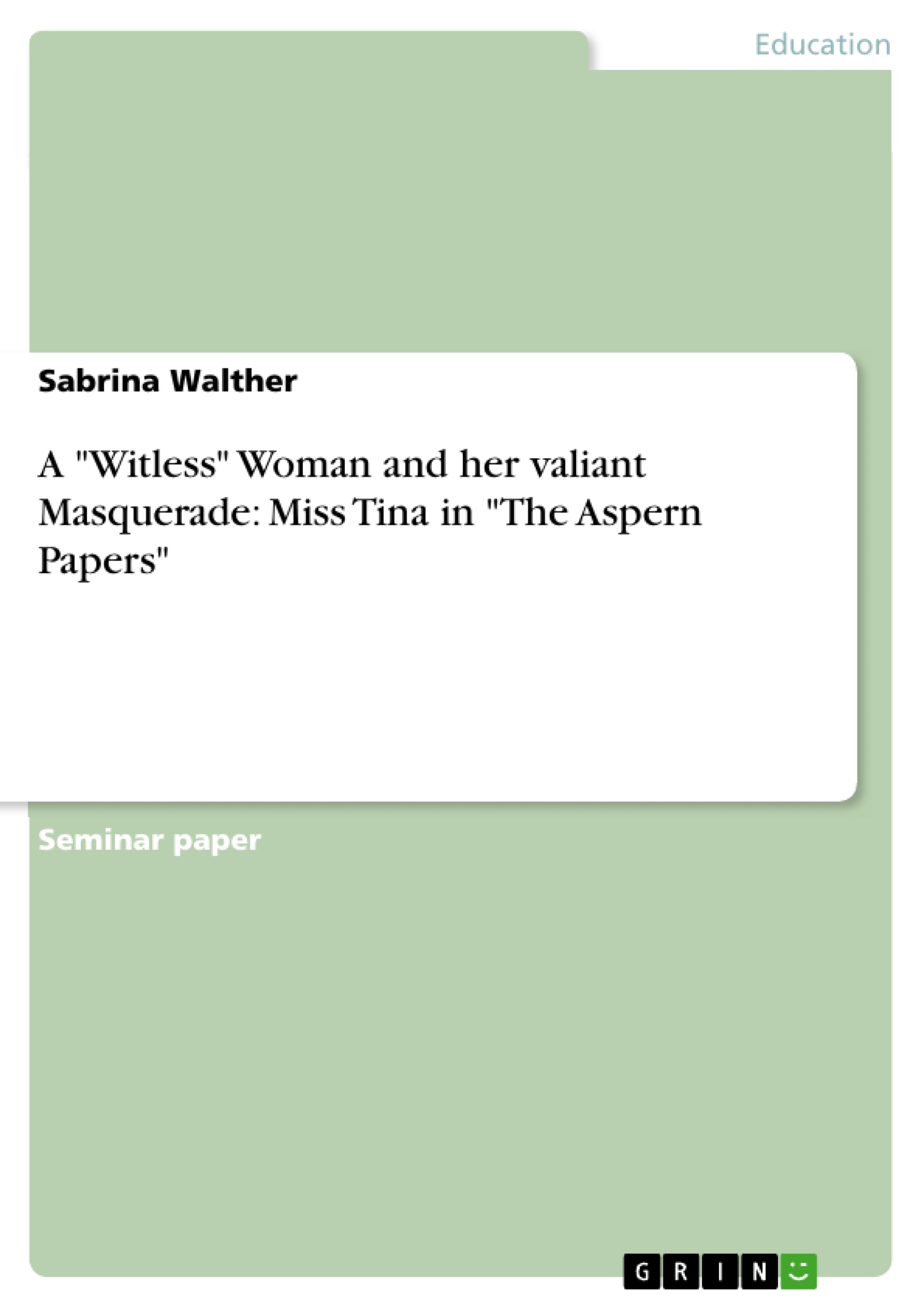1 Introduction
"[I]n fact I afterwards found [Miss Tina] the bigger of the two in inches.”
- narrator in The Aspern Papers (1888)
At first glance, Henry James’ novella The Aspern Papers seems to be a story about a conquering heroic narrator, who copes with several problems during the story, solves them by implementing a tremendously brilliant plan, and at the end firmly believes to have reached his goal – the long-desired Aspern Papers.
However, James does not simply narrow down his novella to a plain adventurous story à la Indiana-Jones, he rather embellishes it with ingenuity and brilliancy. In order to reveal this brilliancy, the attentive reader will soon realize that it is important for this novella to read between the lines, rather than being just impressed by the artful acting of the narrator. As Gargano once stated: “James’ narrator prepares the reader for the ‘big’ scenes, for James himself the small and transitional scenes tell the fuller truth […]”. Hence, even the spaces within the novella seem to be fraught with tension.
When analysing James’ novella, one will soon realize that there is a quite significant complexity within the text. Indeed, it seems that the characters of the story are so close connected in their thinking and their action that it becomes quite difficult for the reader to distinguish between the person who dupes and the one who is duped at the end of the story. This complexity becomes clear by analysing the story of Juliana’s niece, Miss Tina. Although Miss Tina is not presented as the typical mighty heroine right at the outset of the story, and is often initially seen as a simple-minded minor character, whose only function is to serve as a tool for the narrator to achieve his goal, there is so much more about her. During the novella this “futile spinster” turns into a “clever manipulator” , using the narrator’s obsession with the papers to assert her claims, and finally turns out to be the true heroin of the story.
Inhaltsverzeichnis (Table of Contents)
- Introduction
- A "Witless" Woman and her valiant Masquerade
Zielsetzung und Themenschwerpunkte (Objectives and Key Themes)
The novella "The Aspern Papers" by Henry James explores the dynamics of manipulation and deception in a complex relationship between a narrator seeking to obtain valuable letters and the inhabitants of a Venetian palazzo. The story delves into themes of obsession, power dynamics, and the pursuit of knowledge.
- The transformation of Miss Tina from a seemingly "witless" woman to a cunning manipulator.
- The narrator's flawed perception of his influence on Miss Tina and his inability to recognize her true intentions.
- The role of deception and manipulation in the story, as characters exploit each other's weaknesses to achieve their goals.
- The complexities of human relationships and the ways in which individuals can be both victim and perpetrator in the pursuit of their desires.
- The unreliable nature of the narrator's perspective and the significance of reading between the lines to uncover the true story.
Zusammenfassung der Kapitel (Chapter Summaries)
- Introduction: The introductory chapter sets the stage for the story, introducing the narrator and his desire to obtain the Aspern Papers. The narrator's initial perception of Miss Tina as a "witless" woman is established, laying the groundwork for the unfolding complexities of their interactions.
- A "Witless" Woman and her valiant Masquerade: This chapter examines Miss Tina's transformation from a seemingly insignificant character to a skilled manipulator. The narrator's blindness to her true nature and his misinterpretations of her actions are highlighted, demonstrating the power dynamics at play.
Schlüsselwörter (Keywords)
Key terms and concepts in "The Aspern Papers" include manipulation, deception, unreliable narrator, power dynamics, transformation, "witless" woman, obsession, Venetian setting, and the pursuit of knowledge.
How does Miss Tina transform in "The Aspern Papers"?
Initially presented as a "witless" and simple-minded spinster, Miss Tina eventually reveals herself as a clever manipulator who uses the narrator's obsession with the papers to her own advantage.
Is the narrator of "The Aspern Papers" reliable?
No, Henry James uses an unreliable narrator who believes he is in control, while the "fuller truth" is often hidden between the lines and in small, transitional scenes.
What are the main themes of Henry James' novella?
Key themes include obsession, the ethics of pursuing knowledge, deception, power dynamics in human relationships, and the contrast between appearance and reality.
What is the significance of the Venetian setting?
The decaying Venetian palazzo provides a claustrophobic and tense atmosphere that mirrors the manipulative games played between the characters.
Who is the true hero(ine) of the story?
While the narrator sees himself as a conquering hero, the analysis suggests that Miss Tina, through her "valiant masquerade," emerges as the more complex and ultimately powerful figure.



